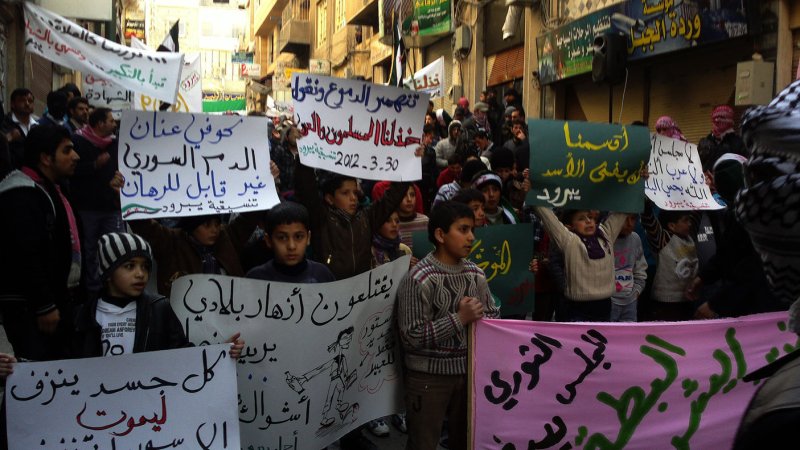Demonstrators gather during a protest against Syria's President Bashar al-Assad in Ebredl near Damascus in Syria, March 30, 2012. UPI. |
License Photo
AMMAN, Jordan, May 17 (UPI) -- The seizure of a ship off Lebanon carrying arms reportedly destined for rebel forces in neighboring Syria underlines how the 14-month-old conflict there is being increasingly militarized.
A recent spate of rebel attacks on President Bashar al-Assad's regime indicates that the Free Syrian Army, largely made up of Syrian military defectors, also points to a growing boldness in anti-regime ranks.
These events, and a report in Monday's Washington Post that the long outgunned and outnumbered rebels are getting more effective weapons, such as anti-tank missiles, courtesy of Assad's foes in the Persian Gulf monarchies, suggest the U.N. peace plan put forward by former Secretary-General Kofi Annan is failing.
The Post, citing U.S. and Syrian opposition officials, said the arms flow to the rebels paid for by Saudi Arabia and Qatar is being "coordinated in part by the United States." That would mark a significant shift in U.S. policy, which has favored a political settlement with Assad surrendering some power and accepting democratic reforms.
The signs are that Assad, who retains the loyalty of the key units of Syria's military and the powerful security services, believes his regime can survive intact if he toughs it out.
The Post specified rebel arms are being stockpiled in Damascus, in the flash point region of Idlib near the Turkish border, and in Zabadani, on Syria's border with Lebanon.
"What's important about this is that it appeared in The Washington Post and would appear to originate with official sources in Washington," the global security consultancy Stratfor observed.
"Clearly, Washington wants a number of facts to be known. First, weapons -- including anti-tank weapons – are now being delivered ...
"Second, the funding is coming from other Arab countries. Third, the weapons are already in the country, indicating that this has been going on for a while now.
"Finally, this does not mean the United States is becoming militarily involved," Stratfor said.
But it could also demonstrate that U.S. President Barack Obama's administration is ready to take a more robust stand against Bashar's minority Alawite regime in hopes of weakening its key ally, Iran, at a critical time.
This would seem to be reinforced by the timing of the apparent leak, a week before a meeting in Baghdad between Iran and its Western adversaries on finding a diplomatic solution to the contentious issue of Iran's nuclear program.
It may be just coincidence that U.S. forces are now engaged in maneuvers with Arab forces in Jordan, Syria's southern neighbor, and will soon be exercising with the Israeli military.
Another coincidence: Israel's Haaretz daily reported Monday that the country's military intelligence chief, Maj. Gen. Aviv Kochavi, had "secretly" visited Washington two weeks ago and let it be known that Israel, which has for the past year believed it was in its interests to keep Assad's regime in place, now feels it's better to get rid of it and deal with an administration dominated by Syria's Sunni majority.
Damascus and its proxies in Lebanon, notably Hezbollah, are complaining that Saudi-backed Lebanese Sunnis are smuggling arms to Assad's foes.
The main Sunni party, the Future Movement headed by former premier Saad Hariri, denies that, even as the porous, mountainous border, crisscrossed by a maze of smugglers' trails, becomes a shooting gallery.
Several Lebanese have been killed by Syrian gunfire in recent weeks.
But on April 27, the Lebanese navy intercepted the freighter Lutfallah II bound for the northern port of Tripoli, a Sunni stronghold and a hotbed of anti-Syrian activity, with three containers holding some 150 tons of weapons purportedly destined for Syrian rebels.
The Syrian-owned vessel, registered in Sierra Leone and flying the Egyptian flag, reportedly loaded the arms containers, which the manifest listed as engine oil, at Benghazi in eastern Libya.
Various accounts said the ship had been chartered by two Syrian businessmen, who live in Saudi Arabia but support the anti-Assad rebels, and the arms came from warehouses in Benghazi controlled by Qatar and Saudi Arabia, two of the Syrian regime's most ardent Arab foes.
Nine other containers holding hundreds of tons of heavy, medium and light arms, had been scheduled to go aboard the Lutfallah II at Benghazi, but didn't, for reasons that haven't been explained.





